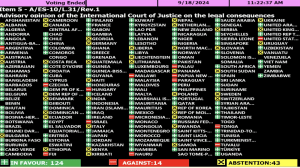On 18 September 2024, the United Nations (UN) General Assembly adopted resolution A/RES/ES-10/24 demanding, inter alia, that Israel “brings to an end without delay its unlawful presence” in the Occupied Palestinian Territory (OPT) within no later than 12 months. This demand aligns with the findings of the International Court of Justice’s (ICJ) Advisory Opinion, Legal Consequences Arising From the Policies and Practices of Israel in the Occupied Palestinian Territory, including East Jerusalem, concluding that “Israel’s continued presence in the [OPT] is unlawful” and must end “as rapidly as possible”.
Al-Haq, Al Mezan Center for Human Rights, and the Palestinian Centre for Human Rights (PCHR) call on all States and international organisations to act without delay and take immediate, effective measures to ensure the full implementation of this resolution and the ICJ Advisory Opinion, put an end to the ongoing genocide in Gaza, and dismantle Israel’s settler-colonial apartheid regime against the Palestinian people as a whole. The international community can no longer afford to turn a blind eye to Israel’s systemic violations of international law and the rights of the Palestinian people.
With 124 states voting in favour, the overwhelming majority of the international community has demonstrated their commitment to justice, the international rule of law, and the protection of universal human rights. This vote is a critical step in addressing and challenging the international community’s decades-long failure to act on and put an end to Israel’s systemic violations of the rights of the Palestinian people. However, we cannot overlook the positions of the 14 States that voted against and the 43 that chose to abstain. Their stance reflects a troubling double standard—one where international law is applied selectively and justice is reserved for only a select few. Their failure to support the resolution undermines their own credibility in upholding international legal principles. Further, it perpetuates the suffering of millions of Palestinians living under Israel’s unlawful occupation, especially as 2.3 million Palestinians continue to endure an ongoing genocide for nearly a year. As a group of 39 independent UN experts described, “The world stands upon the edge of a knife: Either we travel collectively towards a future of just peace and lawfulness – or hurtle towards anarchy and dystopia, and a world where might makes right”.
While this resolution marks an important step toward ending Israel’s unlawful occupation and ongoing genocide, it alone will not end the suffering of the Palestinian people; which can only be achieved when the international community fundamentally changes its approach. The international community must centre and address the root causes of the Palestinian struggle. We reiterate that any established mechanism to follow up on Israel’s violation of Article 3 of the International Convention on the Elimination of All Forms of Racial Discrimination (CERD), as reaffirmed by the ICJ, should mirror the work of the UN Special Committee against Apartheid and must address Israel’s apartheid regime over the Palestinian people as a whole, which is entrenched since the establishment of the State of Israel in 1948 and serves as a tool to maintain its Zionist settler-colonial project. Moreover, while the resolution called for the creation of an international register to document damages and support efforts to secure reparations from Israel since the start of its unlawful occupation, we re-emphasise that this does not prejudice further reparations owed by Israel for damage caused prior to 1967, including to Palestinian refugees since 1948, nor does it exempt Israel or the international community from their obligations to ensure that the Palestinian people are finally able to exercise their right to self-determination, including the right of return of Palestinian refugees.
The time for symbolic gestures and rhetoric is over. The responsibility lies with the international community to ensure that this resolution is not another empty gesture, but the beginning of the end for Israel’s unlawful occupation and settler-colonial apartheid regime. The focus must now shift toward translating this resolution into decisive, long-overdue, and impactful actions. States must immediately implement all measures within their disposal as foreseen by international law, including those highlighted in the resolution, to end Israel’s colonial violence and apartheid that have oppressed the Palestinian people for over 76 years, including through:
- Imposing lawful and targeted sanctions, including ending diplomatic relations with Israel, imposing banking and financial sanctions, suspension of trade or other cooperation agreements with Israel;
- Imposing a two-way arms embargo, including all arms, security, surveillance equipment, jet fuel, training and joint exercises, and stopping all export, import and transfer, including parts and components and other dual-use items, to and from Israel;
- Imposing targeted sanctions on complicit physical and legal persons, Israeli and international corporations and institutions involved in Israel’s breaches of international law and international crimes;
- Investigating and prosecuting dual citizens serving in Israel’s military and providing clear directives to citizens to refrain from enlisting in the Israeli military; and
- Activating universal jurisdiction mechanisms to hold suspected perpetrators of international crimes accountable, including the crimes of population transfer, apartheid, and genocide, in their own domestic courts.
Words must lead to action, as words alone will not bring justice. Inaction only perpetuates Israel’s impunity and the ongoing oppression of the Palestinian people.


